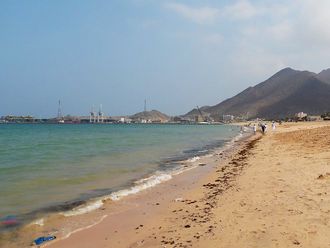Abu Dhabi: The Abu Dhabi government has established a committee to uphold conservation of water resources, particularly in the agricultural sector, officials announced on Wednesday.
Over 65 percent of water is consumed by the agriculture and forestry sectors alone; in comparison 23 percent consumed by the domestic sector, according to a report produced by the Environmental Agency – Abu Dhabi (EAD) in 2006.
This led officials to call for a review the traditional agricultural practices being followed, in a bid to conserve the scarce water resources available, thus resulting in the formation of the committee.
Called the 'Permanent Committee for Water and Agriculture Resources', it will be responsible for drawing up policies, strategies and plans concerning the water and agricultural sector in the Emirate.
Amongst the committees plans are to promote use of native plants to adorn the capital's streets which require minimal irrigation. Methods for rationalizing water consumption also include using underground irrigation systems where less water is lost due to evaporation.
With groundwater is being pumped 24 times faster than the rate of natural replenishment and desalination being an unsustainable option, conservation is the only solution, officials said.
Under the directives of the President Shaikh Khalifa bin Zayed Al Nahyan, a decree was issued on December 24 to establish the body. It is chaired by Mohammad Al Bowardi, Secretary General of Abu Dhabi Executive Council with Majid Al Mansouri, Secretary General of EAD as deputy chairman.
"Unplanned and uncontrolled groundwater withdrawals, especially in the agriculture and forestry sectors, now total over 2 billion cubic meters per year and have resulted in declining groundwater levels and quality in many areas", read the 2006 report.
It also said that the water policy in the Emirate has been largely based on supply, rather than demand management, and relies on large, expensive desalination plants to supply drinking water.
But the new committee hopes to make a difference. Its responsibility includes developing an inventory of all water resources - groundwater, desalinated and treated waste water.
The committee will evaluate, review and adopt modern techniques in water production and treatment as well as wastewater treatment and its reuse.
It will study the best techniques used in the agricultural field and how they could contribute in increasing the food self-efficiency. It will also review and prepare a plan for strategic water reserves besides looking into the establishment of an Abu Dhabi Water Council.
During the committees' first meeting, Al Bowardi stressed the importance of water resources in the development process and the economic, environmental and social impact of the challenges facing the rationalization of water usage.
He stated that the government exerted efforts to build large-scale projects aimed at providing water sources despite the scarcity of water resources in the Emirate and the high cost of these projects.
Al Mansouri noted that presently there is no long term emergency plan and there is no usage of modern irrigation techniques.
Committee’s recommendations
To form a technical secretariat of the Committee that would include a number of experts in water resources, agriculture, irrigation, the reuse of treated water and the calculation of water requirements and consumption of crops and plants to water and this is to be done by the best experts in this field.
To adopt a proposed study of advanced treatment (Nano - Ultra) for the waste water.
To study and develop the terms of reference for the establishment of a productive exemplary farm.
EAD to conduct the project of inventorying all the wells and farms as well as measuring soil and water salinity and classifying them in addition to developing an exemplary data base.
To link waste water treatment units, which has a non-used surplus of treated waste water, to irrigate the forests or the parks and the gardens in these areas
Source : EAD












